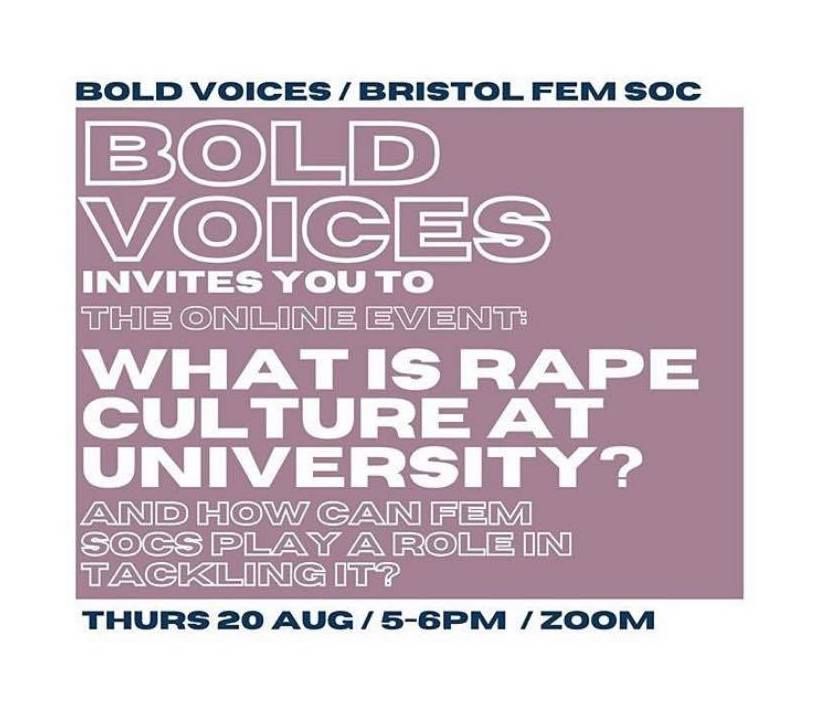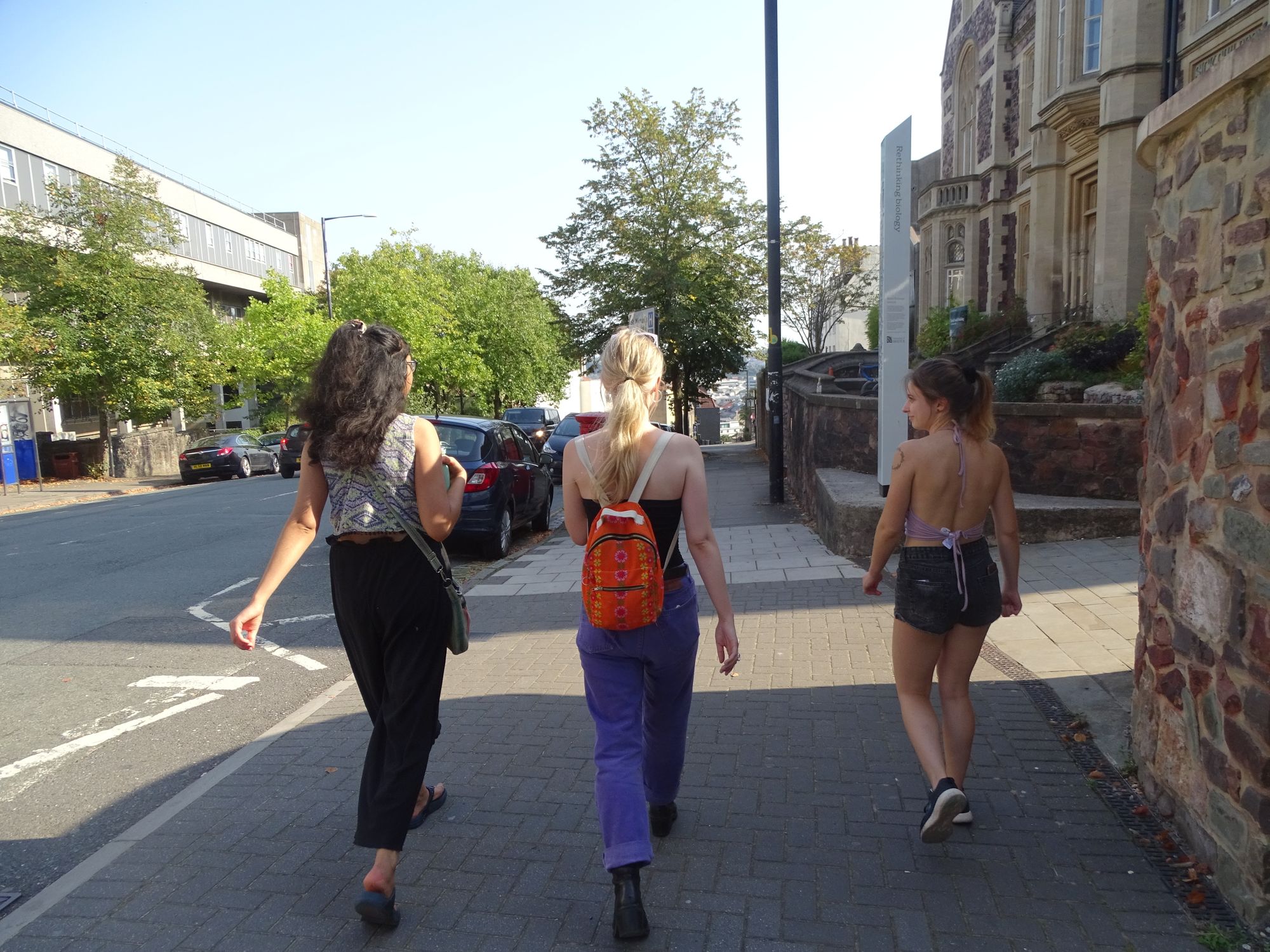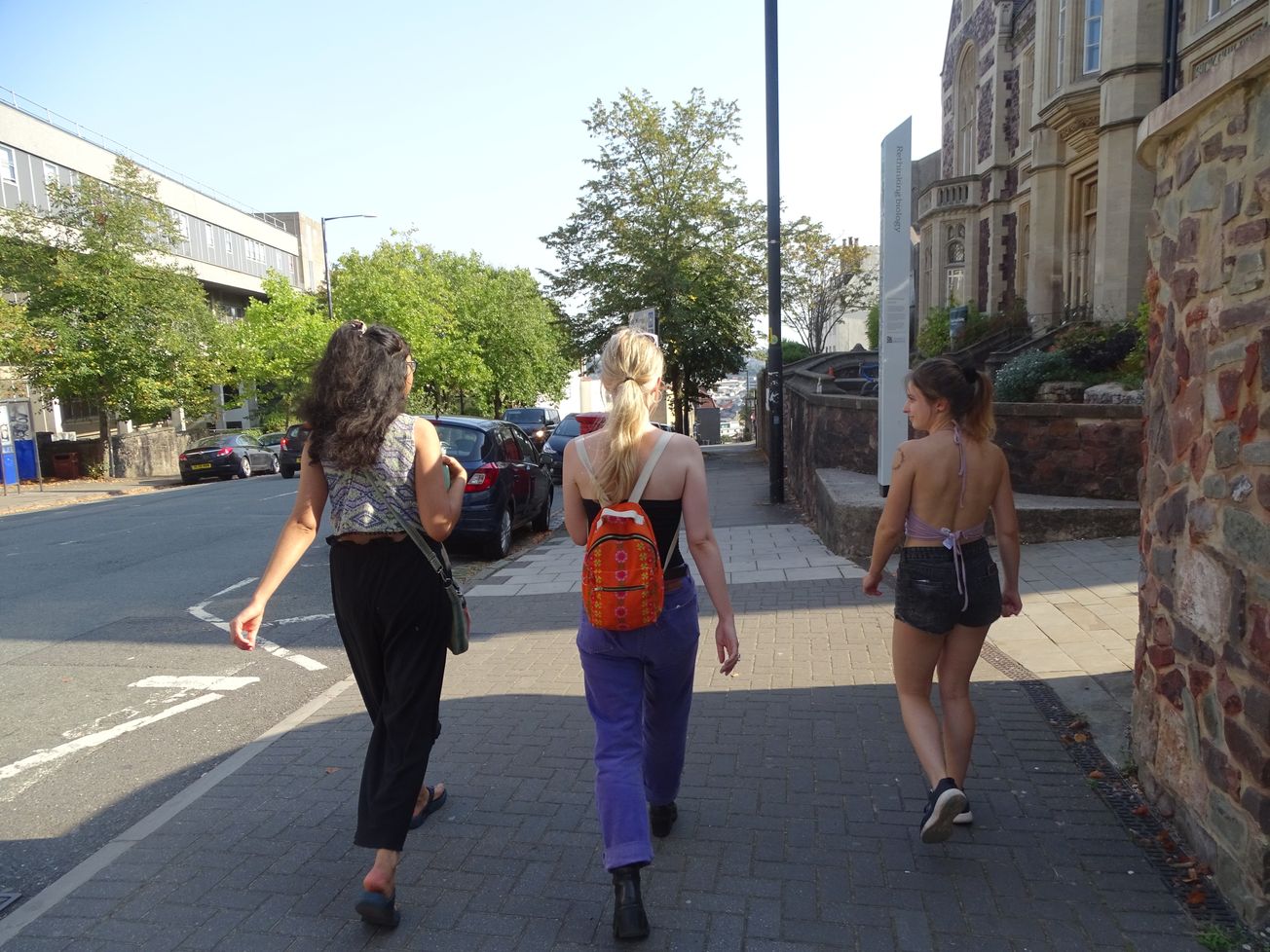by Ellie Spenceley, Second Year, English
The Croft // Ellie Spenceley discusses the active partnership between Bold Voices and the UoB Intersectional Feminist Society this year and explores why such action is necessary to address the damaging rape culture that is pervasive in universities across the UK.
Content warning: this article contains references to rape and sexual assault.
The University of Bristol’s Intersectional Feminist Society is partnering with feminist organisation Bold Voices this year to help tackle rape culture on campus in Bristol.
Rape culture manifests when sexual violence is condoned and normalised through societal attitudes, actions and structures. Almost two thirds of students have experienced some form of sexual violence while at university. High rates of sexual violence are caused by a culture that normalises the issue, and this is sustained through a lack of education and an affiliate reluctance to have difficult conversations.

Even in the #MeToo era, where we have seen women bravely sharing their experiences with sexual assault and supporting others who have done the same, there still seems to be a lot of work to be done to ensure individuals are protected from falling victim to the patriarchal structures that enable sexual violence.
On interconnected personal, social, and institutional levels, sexual assault allegations are still trivialised and the threat of sexual violence is still omnipotent in women’s lives. This needs to change, and we all need to be active in our resistance to this so-called norm.
On interconnected personal, social, and institutional levels, sexual assault allegations are still trivialised and the threat of sexual violence is still omnipotent in women’s lives
We need to be working to tackle the pervasive rhetoric that perpetuates this culture in all areas of society, but how does it manifest specifically in a university environment, and how can we combat it? What is unique about rape culture in a university environment compared to other areas of society? Why does it exist, and what feeds it? What makes it so hard to tackle?
The wider culture of misogyny at university is proliferated through casual remarks about women’s bodies, ‘rating’, and even ‘shag’ charts in accommodation where people compete to see how many people they can sleep with.
Whilst casual sex is by no means a bad thing when done in a safe and healthy way, when combined with the rampant alcohol habits of many university students, it often leads to women being taken advantage of when they are not sober enough to properly consent. Groping in nightclubs is a common and expected encounter for women on a night out, and a simple ‘stop’ often isn’t enough to evade the situation.
Given the social aspect of university life, there is also an increased likelihood that sexual assault will be committed by someone known to the victim, which often prevents them from reporting the crime under the impression that it is not serious, or out of fear that they will be ostracised from friendship groups. Women also often feel afraid to say ‘no’ once they have reached a certain point of intimacy with somebody, fearing that they will be accused of leading the person on or just considering it easier to stay quiet and get it over with.
Lad culture is an epidemic that values male egotism over female selfhood. The ease with which pornography can be accessed has also created a false idea in the minds of both male and female students about what a real sexual encounter looks like; women are often expected to automatically assume a more docile and submissive role during sex, and men often assume that consent to one thing is consent to all.
With a lot of pornographic content conflating violent acts against women together with sexual pleasure, it can be easy for a woman to find herself in a position where she is participating in a sexual act that she feels uncomfortable with but feels unable to outright reject.
If we want to take steps to avoid generating accidental traumas and ensure that women feel as engaged and safe during sex as men do, we need to normalise explicitly asking for consent and checking in with partners throughout a sexual encounter.
However, normalising consent culture is tragically difficult in an environment where men are taught to view sex as some sort of coming-of-age conquest. University is a time when many young people are experimenting with their sexuality for the first time, and so it should also be a time when discussions around safe sex practices are encouraged and enforced so as not to perpetuate the power dynamic that turns women into objects of discussion for male power trips.
We need to normalise explicitly asking for consent and checking in with partners throughout a sexual encounter
If we are to change the collective view that young people have about sex and attraction, making consent and accountability talks mandatory in freshers’ week and at certain points throughout the year would be a start.
Those of us who are speaking up about the abhorrent ways that the patriarchy attempts to take women’s ownership away from their own bodies often get caught in an echo chamber of our own awareness. Contrary to the steps being made in the wider world around female bodily autonomy, university spheres still reek of toxic masculinity.
Discussion and prevention need to be streamlined and not kept within societies, networks and communities that are most affected. Rape culture should be on the agenda of sports societies just as much as it is on the agenda of FemSoc and the Women’s Network. Help centres need to be normalised and promoted so that victims feel safe and informed about how to report their experiences and feel supported through the process of making sure their abuser is held accountable.
A report by the National Union of Students found that only four per cent of affected students reported sexual violence to their institution and 10 per cent to the police. The victim is never to blame, but the fear of just that is what holds most back.

Ultimately, to tackle rape culture within a university environment we need to prioritise knowledge, safety, and accountability. Introducing more concrete penalties for perpetrators and providing safe spaces for victims to come forward, without the fear of being shut down or dismissed, would be part of the solution.
The university and the Students’ Union working collaboratively and creatively to ensure that the student body is informed about the nuances of sexual assault and the various forms it comes in – the harmful experiences some women may not recognise as abuse – would be another.
Opinion | Reclaim the Night is still vital
Inspiring women at Bristol University | International Women's Day 2020
Rape culture remains firmly in place when the voices that need to control the narrative are the ones that are being silenced. Until we are heard we will not be seen. As we enter an era where discussion of student mental health is becoming less of a taboo and more support systems are being put in place to protect student wellbeing, so too should we recognise the fact that sexual health and safety plays an integral part in this for many.
Organisations like Bold Voices aim to shift the power back to young people and reverse narratives that protect those who assault at the expense of those who are assaulted. As we move forward and actively incorporate education and prevention into our university ethos, we must recognise that identifying the causes of rape culture is vital if we are to prevent the symptoms.
Silence is violence, so we must make noise.
Featured image: Epigram | Eve Coleman









